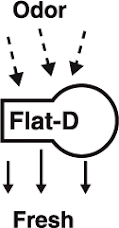Flat-D has an organic solution for flatulence odor control.
Here is a nice article on the subject.
Organicauthority.com
Written by Barbara Feiner, Contributing Editor
It's a subject no one talks about: flatulence. We rely on several colorful euphemisms to hide our embarrassment: passing gas, breaking wind, cutting the cheese. But let's face it: We all fart. (There, I've said it…)
In fact, you can expect to dispel intestinal gas more than a dozen times a day, so it's time to stop blaming the dog and accept this bodily process as a sign of gastrointestinal health. Eat your fair share of natural and organic food, and you'll prove you're human.
Flatulence Facts
Most digestion occurs within the small intestine, where enzymes and bile break down food. These enzymes, however, are unable to break down some elements, such as specific sugars in beans and other plants. Thus, undigested matter passes into the large intestine, where bacteria ferments it. This leads to the production of "flatus" (gas), composed primarily of carbon dioxide, methane and hydrogen.
Ironically, the more healthful and fiber-rich your diet, the more likely you are to experience flatulence. Other factors include how much air you swallow, the amount of bacteria residing in the intestine and the time it takes for food to pass through the colon.
"It's not the foods themselves, but the body's reaction to them that causes the problem --and that we can largely control," says Karen Collins, RD, nutrition adviser for the American Institute for Cancer Research (AICR) in Washington, DC. "There are a host of small changes people can make in how they cook, eat and live that will help eliminate side effects like bloating and gas."
Organic Diet Do's and Don'ts
Most Americans fail to consume enough fiber-rich fruit, vegetables, whole grains and beans, Collins notes -- a phenomenon that can lead to gastrointestinal distress. Sometimes, however, when we add large quantities of organic fruits and vegetables to our diets in an effort to eat well, we go overboard. Our bodies then have trouble adjusting to the change, and we may develop gas.
Instead, we need to increase fiber gradually so our gut has a chance to get into gear. The AICR offers the following tips for preventing a "personal gas crisis":
1. Start Small
"The most important thing is to give the body a chance to adapt to an increase in fiber," Collins says. She urges Organic Authority readers to start with a bowl of whole-grain cereal one morning. Each day thereafter, add a single serving of fruit, a vegetable or whole-grain bread. In the beginning, choose foods that contain easier-to-digest soluble fiber, such as oats, oat bran, apples and carrots.
Cook onions, garlic and cruciferous vegetables (broccoli, cauliflower). Soak dried beans before cooking with them to remove sugars that are fermented by intestinal bacteria.
2. Drink Extra Fluid and Increase Exercise
To enjoy the benefit of organic food, remember to drink plenty of water and get enough exercise -- both of which help move fiber through the colon.
"Fermentation is what produces the gas, and the longer food remains in the digestive tract, the more fermentation occurs," Collins says. "So, as a general rule, anytime you increase fiber intake, you must also increase water intake along with it. This is necessary to facilitate food's transit through the gut."
3. In the Beginning, Cook Vegetables and Fruits
Roasting, baking, broiling, poaching and steaming organic vegetables and fruit helps your digestive system break them down, without delaying passage through the colon. Conversely, if you cook vegetables in oil and butter, they'll remain in the stomach longer.
Tuesday, September 21, 2010
Subscribe to:
Posts (Atom)
